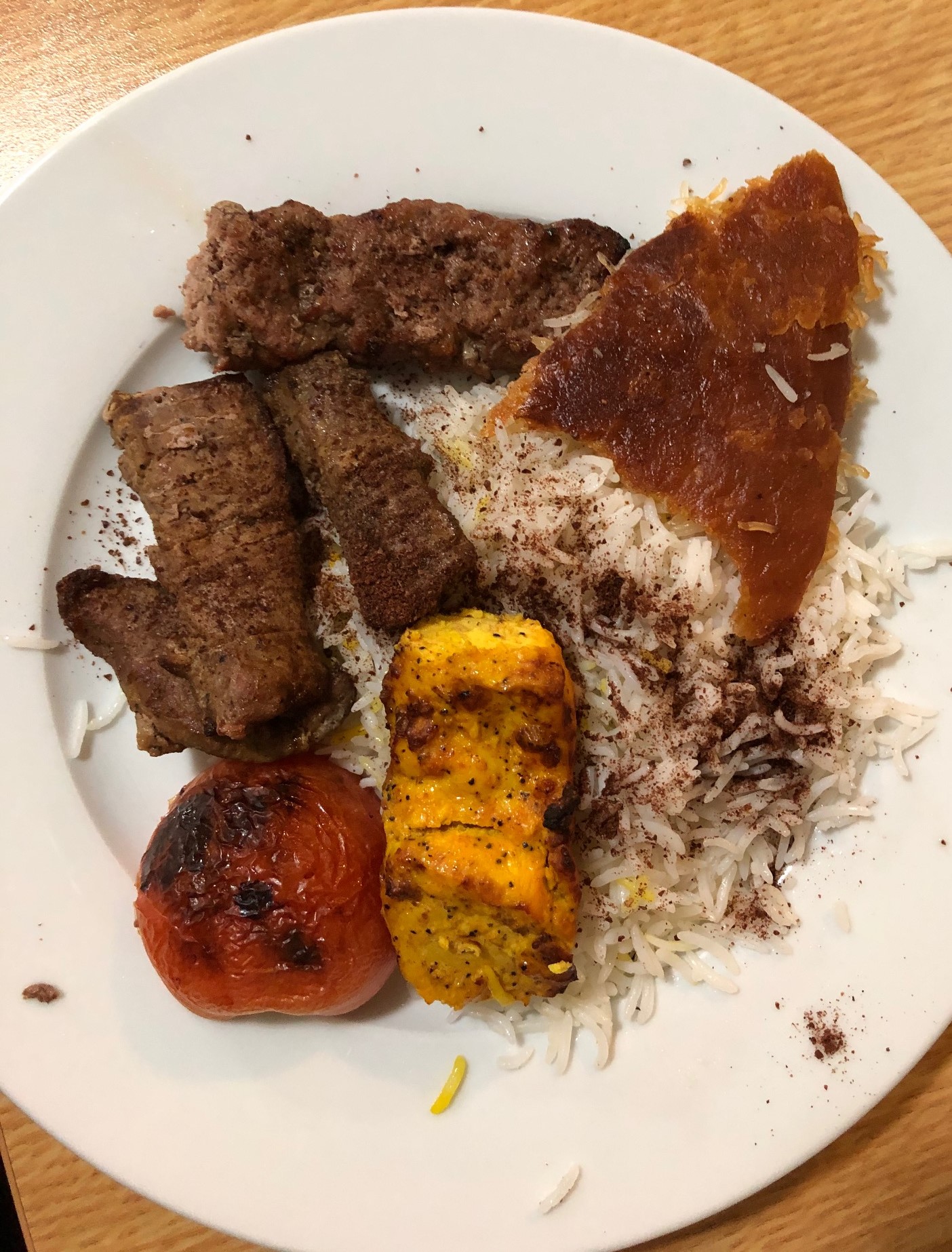Cyrus Fiori rates Poke Box 8 out of 10 spoons
Hey Food Fans,
I come to you from the fluid weeks of the Quarantine Summer. As the days lazily flow across the calendar, the merciless sun bakes them into an endless expanse of time. Weekdays dress and chatter like weekends, while weekends themselves pull overtime to make up for their loafing counterparts. As I squelched my way through this unproductive slick, the sinister shadow of a takeout menu stretched over
my head. Suddenly, I was once again caught in the clutches of domineering delivery, this time at the Kabob Hut, a Persian restaurant on University Ave.
Traditional Persian kabob is a prime example of a problematic craft which appears effortless in its execution. The three main varieties are Koobideh (ground meat), Joojeh (chicken breast), and Barg (striploin). Each type of kabob has its own iconic spice blend and mouthfeel.
When cooking Koobideh—the most technical of the three—the chef must first mix the different meats, fats, and spices in their proper proportions. Next, he must evenly mold them around a skewer to cook all the ingredients uniformly.
A Kabob commands the respect of a Sultan during its cooking process. The chef must carefully pamper each skewer by faithfully and relentlessly fanning its excellency to obtain just the right amount of heat. The resulting output is scrumptiously juicy and tender meat on a stick. This stick is then promptly vacated, and the kabob is served on a bed of rice drizzled with saffron. A whole roasted tomato completes the dish.
Another Persian delicacy is Tahdig, which is essentially the crispy portion of rice left over at the bottom of the pot. However, when concocted correctly with yogurt, bread, or potatoes, Tahdig can inspire vicious tableside brawls at even the finest of dining occasions.
My order consisted of Koobideh Kabob ($16.99), Vaziry Kabob ($22.99)—which included one skewer of Koobideh and one of Joojeh—and Barg Kabob ($29.99). Each of the items came with a sneakily substantial amount of rice, Tahdig, a roasted tomato, and, oddly enough, French fries. I elected for restaurant run delivery and was promptly notified by email that my food would arrive within an hour. Luckily, it arrived in 40 minutes instead.

I dug into my meat-tastic feast as spurned salads looked on from the sidelines with their bottom leaves quivering. The Koobideh kabob was fantastic. A smashing hit of onion, iconic spices, and juicy meat texture pushed all the right buttons. There was no difference between the medium and well-done Koobideh options. Still, the cooking was similarly optimal in both cases.
The Joojeh kabob was a beautiful sunshine yellow colour. It tasted delicious, with a nontraditional seasoning incorporating more garlic than usual. The Barg kabob, while usually the ritziest of the trio, was somewhat dry and unevenly cooked. This may have been due to my ‘well-done’ decision, which, yes, I know, is an affront to steak lovers everywhere.
The rice was wonderful. It had just enough oil and flavour to keep its supple grains lively. It also had the endurance of a marathon runner and retained its delicious flavour and texture after vacationing for a week in my fridge. This was handy because the portion of rice doled out per order was enough to feed three to four people.
The roasted tomato presented an excellent charred and puckered skin, but was a little too al-dente on the inside. The Tahdig was also nontraditional, although not for the better. The bread utilized left the crust with a very flat and smooth surface; however, it also made it unfortunately pliable. This was a critical misstep, as the lovely thing about Tahdig is that it typically provides great crunchy contrast with the rest of the dish. The fries were mushy and undercooked, but this was understandable. They weren’t from “The Fries Hut,” after all.
Overall, the food was delicious, immense, and a pleasure to eat. A slightly uneven cook on the Barg kabob held it back from excellence, the French fries were better left out, and the unique take on Tahdig was slightly off the mark. However, the Koobideh kabob and the rice really put it over the top.
The price, while high for general student fare, was acceptable for the amount of meat and expertise delivered. Although I successfully cut out the middleman and ordered delivery directly from the restaurant, the extra delivery cost further reinforced my desire to get a TA position next term.
Again, I must express how thankful I am for the essential food workers and their commitment to service during this challenging period.
Until next time,
Stay hungry Food Fans!































